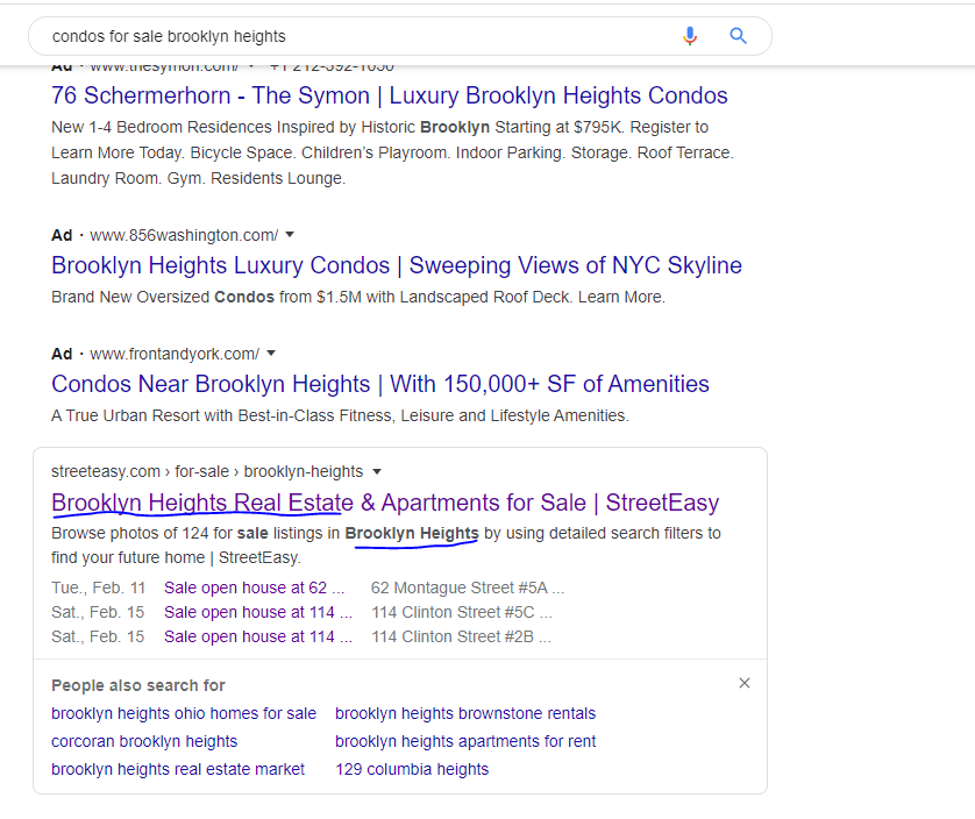4 Digital Marketing Tactics to Generate Fresh Real Estate Leads
By: Rank Media

Establishing your presence online can be immensely challenging, especially if you’re in a competitive industry like real estate. In Montreal, for example, the amount of real estate listing aggregators online makes it somewhat challenging to keep your properties at the forefront, especially if you’re trying to sell residential units in dense markets. Once you start breaking down the number of upcoming developments by neighbourhood, the amount of competition is just outright staggering. Fortunately, some excellent digital marketing tactics can complement real estate advertising and bring a wealth of traffic to your doorstep and generate fresh leads hand over fist at a reasonable cost. Sounds fantastic, right?
1) Dabble in the art of SEO
When it comes to search engine optimization and real estate, the jokes and sayings write themselves.
- “Invest in building real estate on Google.”
- “Beat the competition and secure your home on the first page.”
- “Don’t mortgage your future on TV ads – close the deal with SEO instead.”
Ok, while I may be forcing the humour on the last bullet point, the main lesson here is that ability for real estate brokers & agencies to utilize the power of local SEO to dominate search results for targeted areas. Let’s take a look at a search in Brooklyn Heights, NY:
Regardless of which neighbourhood ends up being your targeted destination, there are bound to be multiple ad listings and substantial competition in the form of significant real estate websites (Realtor.com & Zillow.com in the United States, for example.) However, if you look at the listing above, Streeteasy.com utilized the power of segmenting their site by region to capture traffic for specific searches, driving users to highly targeted pages and cementing their space on the first page of Google. Rather than limiting their focus to global keywords like “New York Real Estate,” their website is perfectly optimized to capture traffic for a myriad of smaller-volume searches that will attract more relevant traffic.
When it comes to real estate SEO, your overarching strategy doesn’t have to be overly complicated. Remember, people searching for real estate are typically looking for properties in specific areas and prone to compare multiple listings at once, which means there’s a good chance they’ll abandon websites that don’t serve them pertinent information.
A structured organic search strategy is essential to capture only the most relevant traffic. Otherwise, you’ll be attracting web users that swipe left on real estate listings faster than a hedonistic Tinder user. When figuring out how to optimize your website’s architecture, it would be best if you built out pages for every borough you want to target and identify the potential keywords that would lead to those landing pages.
On a fundamental level, ensure that your website contains highly-informative and authoritative content, structured data, and the right technical structure that makes Google’s emotionless bots proud. As for the content you create, it’s important to follow Google’s guidelines relating to expertise, authoritativeness, and trustworthiness (also known as EAT)
Publishing content that isn’t correctly fact-checked and under the guise of a “n00b” won’t earn you brownie points with search engines. However, authoritative content from reputable sources will perform far better on search engines, providing information from a trusted author in specific fields.
2) Go Head First into Hyper-Targeted Search Advertising
While SEO will help you generate quite a bit of traffic for local searches, it’s almost a requirement for real estate agencies to invest in paid search (also known as PPC Advertising). Unfortunately, it can become quite competitive atop the mountain on Google, which is why it makes sense to develop very structured campaigns that will yield the best results.
When it comes to search advertising on Google – and in some cases, you’ll extend your budget to the enigma known as Bing – it’s essential to identify the right keywords that your potential buyers are using. In some cases, identifying keywords with significant search volumes like “condos” and “homes for sale” may seem like the holy grail of traffic. However, brazenly targeting high-volume broad keywords will likely exhaust your budget quicker than a bachelor party in Vegas (author’s note: this is true).
Instead of spending your entire budget on high-volume keywords, break down your target audiences by target region and maximize coverage for less competitive search terms that might yield better results. Additionally, ensure your landing pages establish clear calls to action and compelling ad copy. While it may seem like sending traffic to your website makes the most sense, creating separate landing pages eliminate many barriers to entry and can serve as a catalyst for a successful lead gen program.
Regardless of what you choose with regards to the final destination, ensure that the mobile experience is fluid and conducive to lead generation. Part of your analysis should verify if property information is easily downloadable, images load instantly, and call-to-action prompts are easily visible and accessible.
Lastly, reserving a budget for display advertising should be part of your marketing plan, as custom-intent audiences can be ripe for the picking on Google, as well as effective retargeting campaigns. Looking beyond Google, you can venture into the programmatic or native world for display advertising. Still, the capital required to test these strategies may prove to be too immense for real estate agencies operating with tighter budgets.
3) Discover the Awesomeness that is Facebook Advertising
Many businesses bemoan the ridiculousness of Facebook’s algorithm updates in recent years. Fortunately, for savvy advertisers, their advertising dashboard has become an all-you-can-eat buffet of savoury targeting options and launching pad for cost-effective campaigns. Similar to setting up campaigns on Google Ads, you’ll want to narrow down your targeting to smaller audiences rather than big fish. The first step to identifying the potential money-making audience is to define the target buyer for your real estate project.
If you’re selling luxury waterfront homes in Connecticut, you may want to restrict your targeting to users that are affluent and have a proclivity for engaging with pages that speak about luxury and other 1% topics. On the other hand, if your condo development project contains affordable units fit for families, adjust your targeting to reach users based on certain life events (engaged, recent birth of a child, etc.) Real estate advertising on Facebook requires a blend of creativity and data science to ensure long-term success.
Tailoring your ad copy and assets to specific target audiences based on their position within a purchasing funnel is also an essential step to managing cost-effective campaigns.
Two incredible advantages of social media advertising on Facebook include:
- Targeting users on Instagram: cross-platform advertising is significant here as you can reduce your cost-per-lead by extending into the image-driven life of Instagram. Instagram stories, in particular, have produced ridiculously low CPLs for some of our clients in the past, where we tailored video content JUST for stories to capitalize on the low cost.
- Enable lookalike targeting of customers and leads. Depending on the nature of your product and the amount of customer data you have, targeting lookalikes of valid, viable leads can help you reduce your CPL significantly and make better use of your advertising dollars. Facebook will automatically adjust targeting based on the data you provide, so it’s crucial to capture as much as possible from potential leads to increase match rates within the Facebook platform.
Lastly, it’s imperative to set up various campaigns on Facebook. As mentioned previously, adjusting ad copy by ad set will likely increase the click-through rate of your campaigns, reducing the overall cost per engagement. However, you need to take this a step further and adjust ad copy to users based on where they lie within your funnel. You can set up your campaigns according to how users interacted with your brand:
- Cold Traffic: users that have not engaged with your business yet, segmented by interests, demographics, and custom audiences (lookalike targeting, for example).
- Re-engagement: targeting users that have either interacted with your ads or watched a significant portion of video ads.
- Retargeting: throw an extra incentive to users that visited your website but abandoned the conversion funnel.
4) Slide into Inboxes Strategically
Lead nurturing via email and text messaging is tactic deployed by many real estate agencies, but horrifically misused. While strategic email remarketing shouldn’t be complicated, too many businesses (not restricted to real estate) think providing every single bit of information under the sun constitutes successful email marketing. On the contrary, compelling copy and strong calls-to-action can make or break an email campaign.
Lead nurturing should mimic your advertising strategies, especially when it comes to segmentation. Keep your marketing activities as segmented as possible so that you can tailor messaging to users depending on where they lie in your customer funnel. If you’re capturing leads from Facebook using their Lead Ads format, you’ll want to serve this extremely cold top-of-funnel traffic more broad information regarding the project than someone that’s making a direct inquiry about model Valencia on floor #4 of your building. Adjusting the content depending on the subscriber’s origin is essential and can dictate whether your email marketing achieves excellent success or falls flatter than a flat earth joke.
Additionally, SMS marketing is a highly stringent and restrictive marketing tactic. Only engage in SMS marketing if you receive explicit consent from users on the lead generation forms you use. Otherwise, you could potentially violate compliance laws and be susceptible to enormous fines. Incendiary users are not going to be thrilled if you repeatedly text them information about an open house they’ll never attend.
Reel in Prospects: Bringing it All Together
In the end, generating leads for real estate will differ based on a variety of factors, such as the competitive landscape, target audiences, and cost of a unit. Additionally, you can deploy more than the strategies mentioned above by developing an organic presence on a multitude of social platforms or experimenting with non-traditional channels.
As a digital marketer, I still believe in the power of effective traditional advertising, which includes an element of out-of-home media. However, a common pitfall is the lack of tracking behind these advertisements, which is why implementing advanced reporting measures can help you pinpoint the ROI of specific campaigns.
For example, if out-of-home advertising is a component of your marketing plan, utilize call-tracking software to append particular phone numbers to each advertisement (or segment of ads) to understand which areas work best for your marketing initiatives.
ROI, CPL, call-tracking….a lot of this can be overwhelming for those that have not ventured through the valley of marketing. However, this is where digital marketing agencies can be relied upon, removing the burden of having to code websites a specific way or writing hundreds of compelling ad copy headlines (ugh, what a nightmare!)
So, don’t fret: if you need assistance deploying the right campaign, reaching out to an agency is as easy as 1-2-3. In fact, we might know a thing or two about real estate digital marketing….just saying.













 (800) 915 7990
(800) 915 7990
